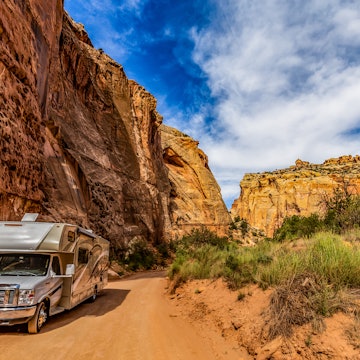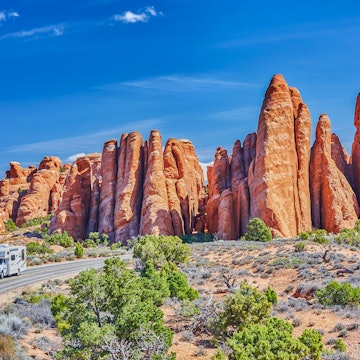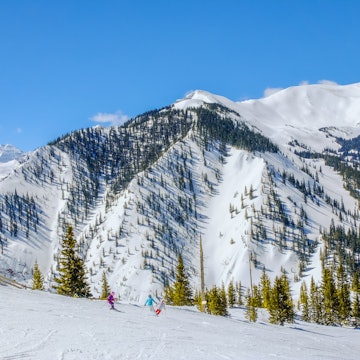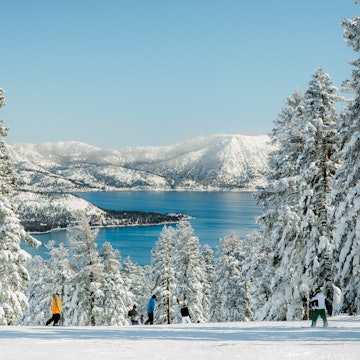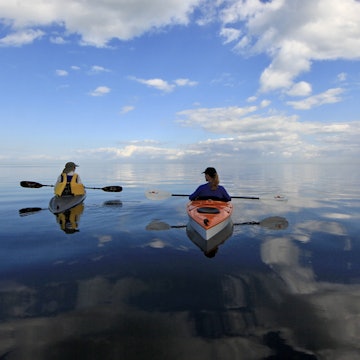
West Virginia's New River Gorge is full of wild and wonderful outdoor adventures

Mar 2, 2020 • 8 min read

A familiar sight at the vertiginous New River Gorge bridge. Flying Pig Studios / Shutterstock
Home to some of the world’s best whitewater, soaring cliffs for rock climbing and an annual BASE jumping festival, the New River Gorge in West Virginia is literally the jumping off point for extreme sports. That might be surprising to anyone who hasn't visited this adventure playground near the cool mountain town of Fayetteville. But if West Virginia were a person, it would be the cool eccentric babysitter that let you stay up way after bedtime, and eat 10 cookies in one sitting.
Remember how exciting it felt knowing you were getting away with something that was normally taboo? Your grown-up self can capture that same exhilarating feeling while conquering Class V rapids or catapulting off one of the highest bridges in the world in the Mountain State. Mom still may not approve, but she can’t stop you. And just maybe she’ll join you.
Why all ages are flocking to New River Gorge
“That’s my son,” says a woman standing next to me on a chilly morning in October—the third Saturday in October to be exact. We are high atop the 876-foot-tall New River Gorge Bridge with thousands of other people gathered to watch hundreds of BASE jumpers fling themselves into the deep tree-lined canyon and toward the swift-flowing whitewater below. Her daredevil son is next in line to take a flying leap. “I could stay home, but I’d rather be here if something were to happen to him.”
You might also enjoy: 20 unmissable extreme sports (and where to try them)
The highly anticipated Bridge Day event is one of the largest and most iconic extreme sports festivals in the world and the only legally sanctioned BASE jumping event in the United States. The participants, who must have at least 100 parachute jumps under their belt before taking part, can choose to jump from a platform at bridge level, dive from a scissor lift that adds 50 more feet of height or get launched from the crowd-pleasing human catapult.
Her son chooses the latter and climbs into the reclined seat at the end of a hinged steel beam. At the end of the countdown, he’s tossed like a rag doll into the abyss. It’s nothing but air for one . . . two . . . three . . . maybe, four hushed seconds until he pulls the rip chord to unfurl the parachute on his back. The crowd lets out a collective sigh of relief, but the jumper’s mom won’t truly relax until he makes his final jump of the day.
While not everyone can BASE jump on Bridge Day, almost anyone can try some of the event’s other less death-defying activities. Schedule an abbreviated version of the year-round Bridge Walk tour for ultimate birds-eye view of the action while harnessed to a safety line on the 24-inch-wide catwalk underneath the bridge. The other option is to zip off the bridge on the High Line, a 700-foot controlled-descent that starts from the catwalk and drops to the ground below. On the way down, you can enjoy fall foliage and beautiful scenery – if you can manage to keep your eyes open.
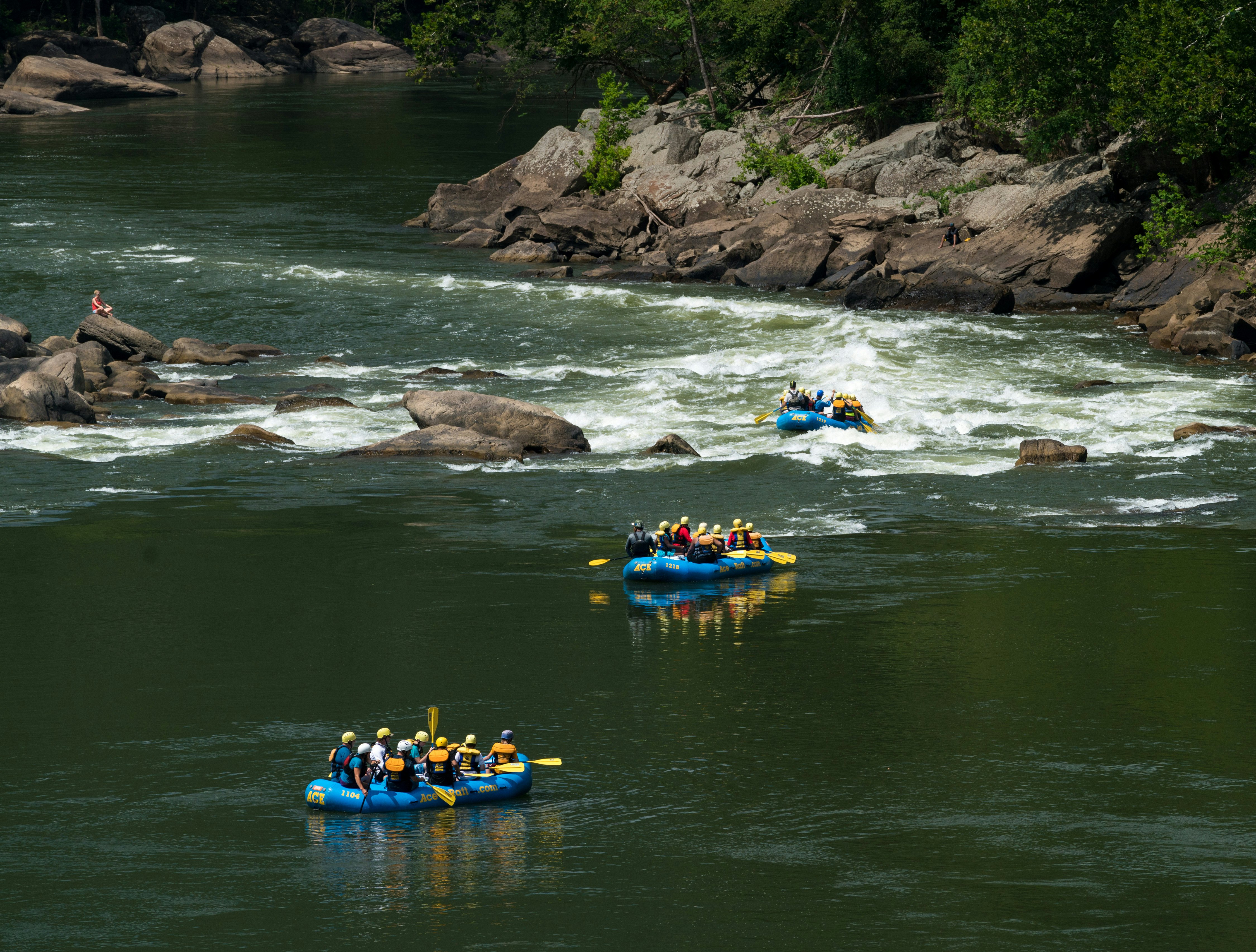
West Virginia has some of the world’s best white-water rafting on the New and Gauley rivers.
Even if you don’t make it to Bridge Day, the New River Gorge National River area offers plenty of other activities for outdoor enthusiasts, even if it’s just walking to the edge of the rim for a panoramic view of the river valley from the Canyon Rim Visitor Center.
And since 1968, when the first commercial rafting company started operating through this remote section of former coal country, whitewater rafting has become a multi-million-dollar industry, attracting both casual weekend adventurers and serious athletes to destinations like the New River and nearby Gauley.
You may also enjoy: Are these the craziest sports in the world?
Despite its name, the New River is one of the oldest waterways in the world. It took millions of years for it to carve a deep gash in the bedrock of the Appalachian Mountains as they simultaneously pushed skyward. These geologic features have created a natural outdoor playground for a wide variety of recreational activities. The river’s water level and intensity of the rapids fluctuate throughout the season, which runs from April to October.
As a general rule, the Upper New River tends to be the calmest stretch—ideal for family friendly float trips—while the most popular route is the Lower New River, which drops over 25 rapids ranging from Class II to IV and ends just below the icon New River Gorge Bridge, one of the most photographed landmarks in the state.
Rafting on the Gauley River, meanwhile, is in a class all its own. It’s even got its own season – Gauley Season. Starting the day after Labor Day, the U.S. Army Corp of Engineers schedules a series of controlled releases of water from Summersville Dam over a five-week period. The releases are coordinated to allow whitewater outfitters to offer trips downstream of the dam over long weekends.
During the short season, more than 50,000 intermediate to advanced rafters ride the epic waves on 25 miles of the swollen Gauley River, which is usually divided in two distinct trips. The intimidating upper section, which starts just below the dam, has been dubbed the "Beast of the East." The river churns up treacherous Class V rapids requiring tight, technical maneuvers as you drop more than 335 feet in 13 miles.
You might also like: Wild swimming in the city: 7 urban breaks to dive into
The Lower Gauley, while slightly less intense, is still an exhilarating ride with more than 35 sets of rapids with names like “Pure Screaming Hell” and “Heaven Help Us.” But you have a little more time in between to enjoy autumn's magnificent shades of green, yellow, orange and red on either side of the river. That can be followed up with backcountry gourmet on the banks of the Gauley if you paddle in with Adventures on the Gorge on their Deluxe Overnight expedition, or celebratory meal in Fayetteville with your fellow adventuristas.
Rafting companies, such as Ace Adventure Resort and River Expeditions can tailor a trip that’s suitable for any skill level. For a complete list of licensed operators, refer to the West Virginia Division of Natural Resources’ website.

The New River Gorge has become a major rock-climbing destination
When you’re 60 feet in the air clinging to a sheer stone face with a few fingers and toes, you may not be thinking about the amazing views, but rock climbing in the New River Gorge is breathtaking in more ways than one. There are thousands of established climbing routes along the continuous expanse of exposed Nuttall sandstone cliffs towering above the New River, plus even more at nearby Meadow River and Summersville Lake, which offers even more options after the U.S. Corp of Engineers lowers the water level in October. The vast majority of the routes are designed for advanced and expert climbers with grades of difficulty starting at 5.8 (for reference, anything from 5.0 to 5.7 is considered easy).
For DIY climbers, Water Stone Outdoors in downtown Fayetteville is a hub for information and gear. If you’re not familiar with the technical aspects of rock climbing, there are many certified climbing instructors and guides who can show you the ropes and point you to some satisfying beginner climbs that pay off when you top out. The Bridge Buttress area, established in the 1980s, has a great lineup of classic routes in a variety of grades, including Easily Flaky (5.7) and Zag (5.8), which is in view of the bridge.
Climb and cool off in Summersville Lake
The crystal-clear water of Summersville Lake is the source of the famed Gauley Season, but when the levels are up and the temperatures are higher boating, swimming, kayaking and rock climbing are among the favorite things to do. The 2,800-acre lake is rimmed by sheer sandstone cliffs that can reach as high as 100 feet above the water. If you struggle to find activities that appeal to everyone in your group, area outfitters can arrange half- and full-day trips that include all of the above and a guide.
You may also enjoy: Catch a wave in the 10 best countries for surfing
With a pontoon boat as a floating base of operations, up to 10 people can explore all the nooks and crannies of the lake and reach places unseen from the shore. One of the most iconic spots on the lake is a steep overhanging rock known by climbers as The Coliseum. Your guide can pull up the boat alongside the rock wall there and fix a top rope at the summit for some easy climbing. The crags and cracks offer plenty of footholds that will bring out your inner rock star — and the rope's there in case you fall.
If rock climbing isn’t your thing, there are kayaks and stand-up paddleboards (SUP) to take out on the sparkling emerald-green water. Leap aboard an SUP and paddle around the bend to explore Pirate's Cove, a horseshoe-shaped inlet with a picturesque waterfall.
Explore West Virginia’s Hidden Coal History
Coal remains one of West Virginia's primary economic drivers, but it's the state's mining past that haunts the New River Gorge National River area. The remnants of more than 50 industrial-era ghost towns can be found tucked under years of overgrowth within the canyon rim, accessible by hiking and mountain-biking trails maintained by the National Park Service. Stop at the Canyon Rim Visitor Center to pick up a trail map before heading out.
The historic town of Nuttallburg has one of the most well-preserved examples of an early-20th century coal-mining complex in the state. Automobile magnate Henry Ford leased the mine for a brief eight-year stint in the 1920s. In that time, he installed cutting-edge equipment, including the site's most notable feature — a 1,385-foot-long gravity conveyor that swoops down the hillside from the mine opening to the processing area next to the train tracks at river level.
Are you hungry for more West Virginia adventures on the rocks? Head to the Monongahela National Forest to hike Spruce Knob, the highest point in the state; clip onto a Via Ferrata at NROCKS; or scale the rugged Seneca Rocks.







